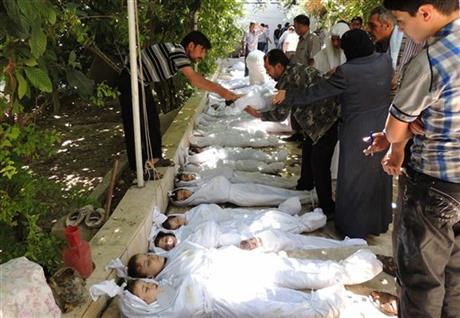
By ELAINE GANLEY
This citizen journalism image provided by the Local Committee of Arbeen which has been authenticated based on its contents and other AP reporting, shows Syrian citizens trying to identify dead bodies, after an alleged poisonous gas attack fired by regime forces, according to activists in Arbeen town, Damascus, Syria, Wednesday, Aug. 21, 2013. Syrian anti-government activists accused the regime of carrying out a toxic gas attack that killed at least 100 people, including many children as they slept, during intense artillery and rocket barrages Wednesday on the eastern suburbs of Damascus, part of a fierce government offensive in the area. (AP Photo/Local Committee of Arbeen)
PARIS (AP) — France’s foreign minister on Thursday raised the possibility of the international community using force if it is proven that Bashir Assad’s regime used chemical weapons in an attack the Syrian opposition says killed over 100 people.
Laurent Fabius spoke a day after the U.N. Security Council called for “a thorough, impartial and prompt investigation” of the latest allegations against the regime, in a statement that diplomats says was watered down by objections from Russia and China.
Opposition forces and activists have said that at least 136 people, including many children, were killed in the Wednesday attack in which most bodies bore no sign of wounds.
Speaking on RMC radio, Fabius did not make clear how the use of chemical weapons by the Syrian regime might be proven. But if there is proof of a chemical weapons attack by the regime, “we need a reaction by the international community …. a reaction of force,” he said.
Fabius excluded boots on the ground as an option, “but a reaction that can take a form, I don’t want to be more precise, of force.”
Fabius said he spoke at length with the head of the opposition Syrian National Coalition chief, Ahmad al-Jarba, who “confirmed absolutely” that the regime was behind the chemical attack. The Syrian government has adamantly denied using chemical weapons in an artillery barrage targeting suburbs east of Damascus.
The attack coincided with the visit to Syria by a 20-member U.N. chemical weapons team which only has a mandate to investigate three previous allegations of chemical weapons use. Without a mandate, which needs Syria’s approval, the investigators would not be able to visit the site of the attack.
The Turkish and German foreign ministers underlined demands for the Syrian regime to allow U.N. inspectors to investigate, but were vague about what the consequences if it doesn’t — beyond renewing calls for sanctions.
“Several red lines have been crossed — if sanctions are not imposed immediately, then we will lose our power to deter,” Turkish Foreign Minister Ahmet Davutoglu said, speaking at a press conference in Berlin.
His German counterpart was more hesitant about an eventual response.
“I am not speculating about what should happen if these reports turn out to be true,” Guido Westerwelle said. “These accusations are so serious, so monstrous that it is necessary to enable a real examination before talking or speculating about consequences.”
Davutoglu, speaking through an interpreter, said the allegations “must be cleared up in the most objective way.” He said he’d spoken to U.N. Secretary General Ban Ki-moon and told him that “the U.N. must not behave hesitantly anymore; sanctions must now be imposed.”
Turkish Deputy Prime Minister Bekir Bozdag insisted it was clear that the Assad regime had used chemical weapons.
“It is clear that chemical weapons were used. It is clear that in Syria, only the Assad administration is in possession of this weapon,” Bozdag said. “The whole world knows who has what amount of weapons, where these weapons are and where they go to. This is clear as day. Everyone knows who used the chemical weapons.”
_____
Suzan Fraser in Ankara and Geir Moulson in Berlin contributed to this report.



